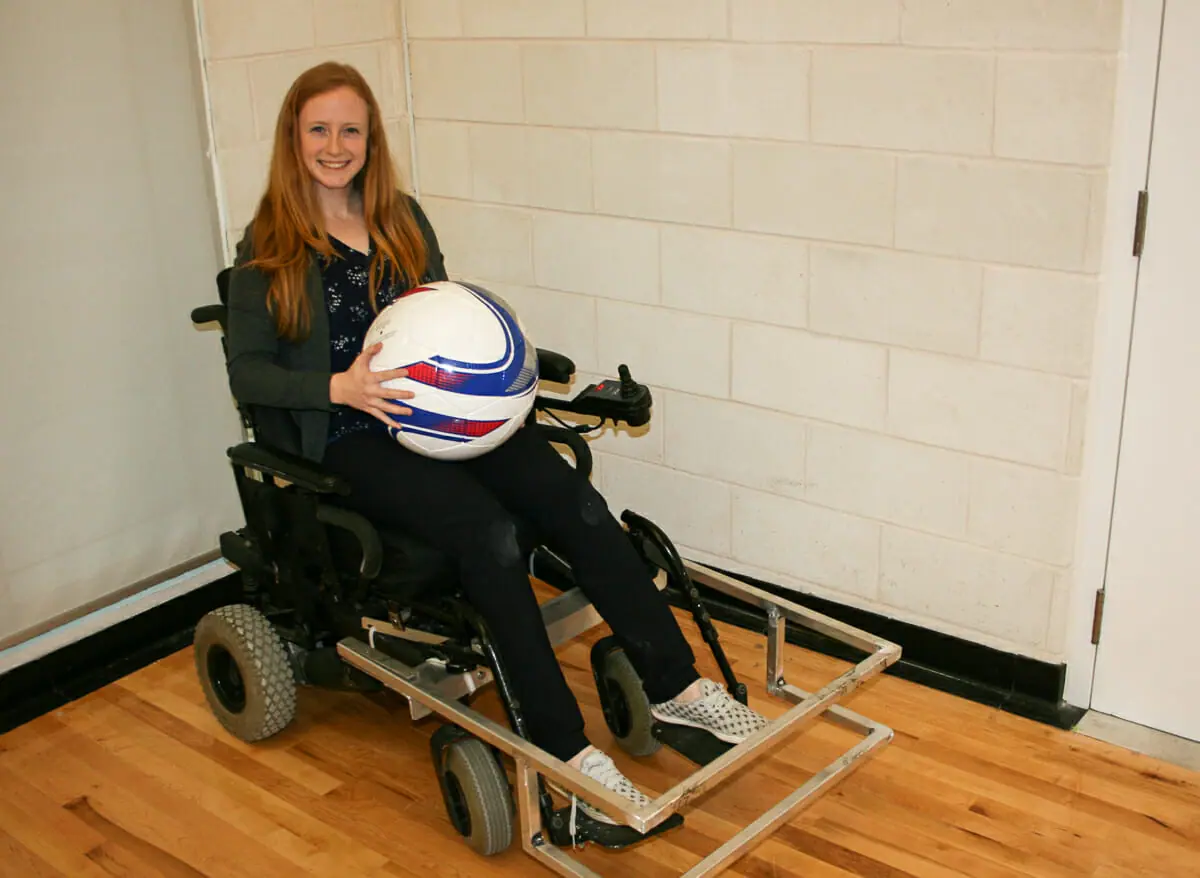April doesn’t just mean the end of classes for Madison Campbell. The fourth-year kinesiology student is also the coordinator for Nova Scotia’s first-ever powerchair soccer program, and it officially starts on April 3.
“It’s really important because I want everybody to have the same opportunities that I had growing up to play sports, no matter what abilities or disabilities you have,” says Campbell.
She first got involved in parasports — sports for people with a disability — in 2017, when she volunteered at a multi-sport summer camp for kids with disabilities.
Paul Tingley, Sport Nova Scotia’s parasport coordinator, first met Campbell there.
“Throughout the week, she just kind of stepped up to be like a leader among the volunteers,” he says. “She was there to really help and make a difference and she really set herself apart.”
About a year and a half ago, Tingley floated the idea of starting a soccer program for people in power wheelchairs. Across Canada, only British Columbia and Quebec have a similar program. The game consists of two 20-minute periods and it’s played with four players –– three players and a goalie.
Campbell was immediately interested. She played soccer growing up and is heavily involved with volunteering and coaching for the United DFC Soccer Club in Dartmouth.
Before the powerchair program, Campbell had experience organizing family fun runs in the Dartmouth community, but this was a much larger task for the 22-year-old.
As the coordinator, she’s responsible for applying for grants to get funding for the program, getting partnerships, organizing gear, advertising and coaching participants once the 10-week program starts.
“It’s pretty tireless what she’s been doing,” says Tingley. “I think her capacity to balance everything is pretty extraordinary, so that’s what separates her. I think she’s not afraid to take the risk in doing something that’s unknown.”
The process hasn’t been without challenges.
A metal “guard” is attached to the bottom of the chair around a person’s feet. That’s what players use to control the ball, which is about the size of a beachball. The guards, however, are only manufactured in the United States, says Campbell, and cost about US$500, not including shipping, for one.
Campbell has partnered with Mad Secret Lab and metal shops in Burnside to manufacture the guards locally and avoid high program costs for participants.
“If this is your only opportunity to play a team-based sport and you can’t afford to play it, like that would just be awful,” she says.
The other major challenge was finding a place to play.
“You need to have a place that’s close to public transportation because these athletes a lot of them just use public transportation because they need accessible vehicles and things like that,” says Campbell.
They also needed a facility with storage: along with the rest of the guards, they have four extra power chairs donated by Easter Seals.
The solution came with the renovation of the renamed Zatzman Sportsplex in Dartmouth, which opened at the end of February.
Tingley says Campell has adapted well to all the different challenges.
“She’s very poised,” he says. “There’s going to be ups and downs along the way, and she keeps a level head through it all and just keeps going forward towards that end goal.”
The program costs $50 for each participant or pay what you can. The fee covers a different skill every week, like ball control, passing, shooting and team tactics. Any extra funding is put back into the program.
Coordinating everything is a volunteer position.
“I just love doing it,” says Campbell. “I don’t want to get paid for that.”
Moving forward, Campbell has applied to physiotherapy programs once she graduates from Dalhousie this spring. She wants to stay involved with powerchair soccer, she and Tingley aim to have a 10-week program running every fall, winter, and spring.
“If you have an interest, you should be able to pursue it no matter if you have disabilities or if you’re an able-bodied person,” says Campbell.
]]>


Recent Comments